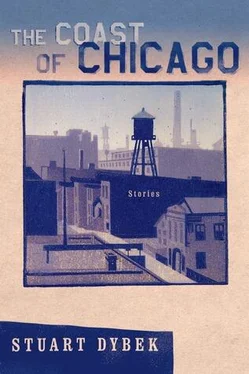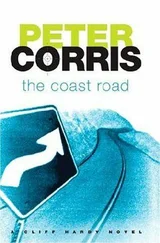There seemed to be some unspoken relationship between being nameless and being a loser. Watching the guys from Korea after their ball games as they hung around under the buzzing neon signs of their taverns, guzzling beers and flipping the softball, I got the strange feeling that they had actually chosen anonymity and the loserhood that went with it. It was something they looked for in one another, that held them together. It was as if Korea had confirmed the choice in them, but it had been there before they’d been drafted. I could still remember how they once organized a motorcycle club. They called it the Motorcycle Club. Actually, nobody even called it that. It was the only nameless motorcycle gang I’d ever heard of.
A lot of those guys had grown up in the housing project that Pepper and Ziggy lived in, sprawling blocks of row houses known simply as “the projects,” rather than something ominous sounding like Cabrini-Green. Generations of nameless gangs had roamed the projects, then disappeared, leaving behind odd, anonymous graffiti — unsigned warnings, threats, and imprecations without the authority of a gang name behind them.
It wasn’t until we became Blighters that we began to recognize the obscurity that surrounded us. Other neighborhoods at least had identities, like Back of the Yards, Marquette Park, Logan Square, Greektown. There were places named after famous intersections, like Halsted and Taylor. Everyone knew the mayor still lived where he’d been born, in Bridgeport, the neighborhood around Sox Park. We heard our area referred to sometimes as Zone 8, after its postal code, but that never caught on. Nobody said, “Back to Zone 8.” For a while Deejo had considered Zone 8 as a possible title for his novel, but he finally rejected it as sounding too much like science fiction.
As Blighters, just walking the streets we became suddenly aware of familiar things we didn’t have names for, like the trees we’d grown up walking past, or the flowers we’d always admired that bloomed around the blue plastic shrine of the Virgin in the front yard of the Old Widow. Even the street names were mainly numbers, something I’d never have noticed if Debbie Weiss, a girl I’d met downtown, hadn’t pointed it out.
Debbie played sax, too, in the band at her all-girls high school. I met her in the sheet-music department of Lyon & Healy’s music store. We were both flipping through the same Little Richard songbooks. His songs had great sax breaks, the kind where you roll onto your back and kick your feet in the air while playing.
“Tenor or alto?” she asked without looking up from the music.
I glanced around to make sure she was talking to me. She was humming “Tutti Frutti” under her breath.
“Tenor,” I answered, amazed we were talking.
“That’s what I want for my birthday. I’ve got an alto, an old Martin. It was my uncle Seymour’s. He played with Chick Webb.”
“Oh, yeah,” I said, impressed, though I didn’t know exactly who Chick Webb was. “How’d you know I played sax?” I asked her, secretly pleased that I obviously looked like someone who did.
“It was either that or you’ve got weird taste in ties. You always walk around wearing your neck strap?”
“No, I just forgot to take it off after practicing,” I explained, effortlessly slipping into my first lie to her. Actually, I had taken to wearing the neck strap for my saxophone sort of in the same way that the Mexican guys in the neighborhood wore gold chains dangling outside their T-shirts, except that instead of a cross at the end of my strap I had a little hook, which looked like a mysterious Greek letter, from which the horn was meant to hang.
We went to a juice bar Debbie knew around the corner from the music store. I had a Coco-Nana and she had something with mango, papaya, and passion fruit.
“So how’d you think I knew you played sax? By your thumb callus?” She laughed.
We compared the thumb calluses we had from holding our horns. She was funny. I’d never met a girl so easy to talk to. We talked about music and saxophone reeds and school. The only thing wrong was that I kept telling her lies. I told her I played in a band in Cicero in a club that was run by the Mafia. She said she’d never been to Cicero, but it sounded like really the pits. “Really the pits” was one of her favorite phrases. She lived on the North Side and invited me to visit. When she wrote her address down on a napkin and asked if I knew how to get there. I said, “Sure, I know where that is.”
North to Freedom, I kept thinking on my way to her house the first time, trying to remember all the bull I’d told her. It took over an hour and two transfers to get there. I ended up totally lost. I was used to streets that were numbered, streets that told you exactly where you were and what was coming up next. “Like knowing the latitude,” I told her.
She argued that the North Side had more class because the streets had names.
“A number lacks character, David. How can you have a feeling for a street called Twenty-second?” she asked.
She’d never been on the South Side except for a trip to the museum.
I’d ride the Douglas Park B train home from her house and pretend she was sitting next to me, and as my stop approached I’d look down at the tarpaper roofs, back porches, alleys, and backyards crammed between factories and try to imagine how it would look to someone seeing it for the first time.

At night, Twenty-second was a streak of colored lights, electric winks of neon glancing off plate glass and sidewalks as headlights surged by. The air smelled of restaurants — frying burgers, pizza parlors, the cornmeal and hot-oil blast of taquerías . Music collided out of open bars. And when it rained and the lights on the oily street shimmered, Deejo would start whistling “Harlem Nocturne” in the backseat.
I’d inherited a ’53 Chevy from my father. He hadn’t died, but he figured the car had. It was a real Blightmobile, a kind of mustardy, baby-shit yellow where it wasn’t rusting out, but built like a tank, and rumbling like one, too. That car would not lay rubber, not even when I’d floor it in neutral, then throw it into drive.
Some nights there would be drag races on Twenty-fifth Place, a dead-end street lined with abandoned factories and junkers that winos dumped along the curb. It was suggested to me more than once that my Chevy should take its rightful place along the curb with the junkers. The dragsters would line up, their machines gleaming, customized, bull-nosed, raked, and chopped, oversize engines revving through chrome pipes; then someone would wave a shirt and they’d explode off, burning rubber down an aisle of wrecks. We’d hang around watching till the cops showed up, then scrape together some gas money and go riding ourselves, me behind the wheel and Ziggy fiddling with the radio, tuning in on the White Sox while everyone else shouted for music.
The Chevy had one customized feature: a wooden bumper. It was something I was forced to add after I almost ruined my life forever on Canal Street. When I first inherited the car all I had was my driver’s permit, so Ziggy, who already had his license, rode with me to take the driving test. On the way there, wheeling a corner for practice, I jumped the curb on Canal Street and rumbled down the sidewalk until I hit a NO PARKING sign and sent it flying over the bridge. Shattered headlights showered the windshield and Ziggy was choking on a scream caught in his throat. I swung a U and fled back to the neighborhood. It took blocks before Ziggy was able to breathe again. I felt shaky too and started to laugh with relief. Zig stared at me as if I were crazy and had purposely driven down the sidewalk in order to knock off a NO PARKING sign.
Читать дальше













